Common_Errors_in_English_usage
Common_Errors_in_English_usage
Common_Errors_in_English_usage
You also want an ePaper? Increase the reach of your titles
YUMPU automatically turns print PDFs into web optimized ePapers that Google loves.
usually flat, whereas the top of a number 1 often slopes down to the<br />
left. If your writ<strong>in</strong>g is to be reproduced electronically or <strong>in</strong> pr<strong>in</strong>t,<br />
it's important to hit that number key at the top left of your keyboard<br />
to produce a true number 1.<br />
LCD DISPLAY/LCD<br />
"LCD" stands for "liquid crystal display," so it is redundant to write<br />
"LCD display." Use just "LCD" or "LCD screen" <strong>in</strong>stead.<br />
Many people confuse this abbreviation with "LED," which stands for<br />
"lightemitt<strong>in</strong>g diode"a much earlier technology. You will often see<br />
explanations even <strong>in</strong> technical contexts <strong>in</strong> which "LCD" is <strong>in</strong>correctly<br />
def<strong>in</strong>ed as "liquid crystal diode."<br />
LOL<br />
The common Internet abbreviation "lol" (for "laugh<strong>in</strong>g out loud") began<br />
as an expression of amusement or satirical contempt: "My brother<strong>in</strong>law<br />
thought the hollandaise sauce was gravy and poured it all over his<br />
mashed potatoes (lol)." It has become much overused, often to <strong>in</strong>dicate<br />
mere surprise or emphasis with no suggestion of humor: "The boss just<br />
told us we have to redo the budget this afternoon (lol)." And some<br />
people drop it <strong>in</strong>to their prose almost at random, like a verbal hiccup.<br />
It is no longer considered hip or sophisticated, and you won't impress<br />
or enterta<strong>in</strong> anyone by us<strong>in</strong>g it.<br />
Note that this <strong>in</strong>itialism has had two earlier mean<strong>in</strong>gs: "Little Old<br />
Lady" and "Lots Of Love."<br />
LAISSEZFAIRE<br />
The mispronunciation "lazyfare" is almost irresistible <strong>in</strong> <strong>English</strong>, but<br />
this is a French expression mean<strong>in</strong>g "let it be" or, more precisely, "the<br />
economic doctr<strong>in</strong>e of avoid<strong>in</strong>g state regulation of the economy," and it<br />
has reta<strong>in</strong>ed its French pronunciation (though with an <strong>English</strong> R):<br />
"lessay fare." It is most properly used as an adjective, as <strong>in</strong><br />
"laissezfaire capitalism," but is also commonly used as if it were a<br />
noun phrase: "the Republican party advocates laissezfaire."<br />
LAND LOVER/LANDLUBBER<br />
"Lubber" is an old term for a clumsy person, and beg<strong>in</strong>n<strong>in</strong>g <strong>in</strong> the 18th<br />
century sailors used it to describe a person who was not a good seaman.<br />
So the pirate expression of scorn for those who don't go to sea is not<br />
"land lover" but "landlubber."<br />
LANGUISH/LUXURIATE<br />
To languish is to wilt, p<strong>in</strong>e away, become feeble. It always <strong>in</strong>dicates an<br />
undesirable state. If you're look<strong>in</strong>g for a nice long soak <strong>in</strong> the tub,<br />
what you want is not to languish <strong>in</strong> the bath but to luxuriate <strong>in</strong> it.<br />
The word "languid" (droop<strong>in</strong>g, listless) often occurs <strong>in</strong> contexts that





